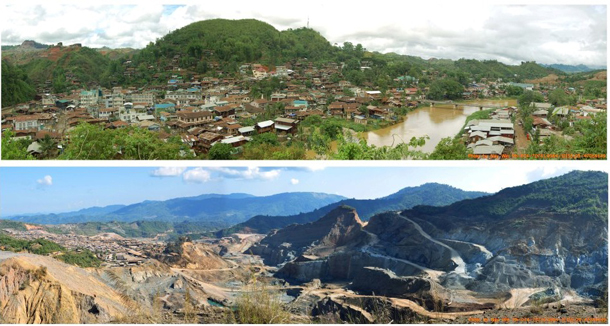Burma’s government is using the promise of development as a key component in its current peace negotiations with armed ethnic organizations, proposing ceasefire first, then development, and finally a national political agreement. This process has been tried before in Kachin State with disastrous consequences.
In1994, the Kachin Independence Organization (KIO) signed a ceasefire hoping that political talks would ensure the rights of Kachins and bring beneficial development to Kachin State. Yet instead of a resolution to conflict, what we have seen in Kachin State since the ceasefire is increased militarization, massive exploitation and export of natural resources, and destructive development projects.
This development assault increased conflict and led to the reigniting of war which has displaced 75,000 people since June last year. The Kachin experience should serve as a warning to other ethnic groups attempting peace through a similar process.
Immediately after the ceasefire, large-scale logging in teak-filled Kachin State began to flourish. Illegal gold and jade mines sprung up along our precious rivers. Forests were cut down, the waters were poisoned, and the course of rivers completely changed. Massive erosion caused floods and landslides. Used oil, mercury and cyanide were dumped at will and now threaten the health of wildlife and local people.
Chinese businessmen have invaded our state, setting up casinos and brothels in KIO border areas. Chinese experts work with Burma’s military to build roads and bridges to take away our natural resources. China imports gold, jade, and valuable raw materials from Kachin State cheaply, and earns huge profits by selling finished products at high prices to foreign countries.
Troops from Burma’s military have poured in, confiscating lands for their army bases and new administrative centers and committing abuses against the local populations, including forced labor and rape.
Military crony and business tycoon Htay Myint and his Yuzana Company bulldozed people out of their homes in the Hukawng valley and turned over 200,000 acres of land in the world’s largest tiger reserve into a chemical-laden mono-crop plantation.
Now China Power Investment Corporation (CPI) is working to build seven mega dams on the Mali and Nmai rivers and at the Irrawaddy Myitsone. Ninety percent of the electricity from the dams will be exported to China and the Irrawaddy Myitsone hydropower dam alone will flood an area the size of Singapore and force 20,000 people from 47 villages to relocate.
The unregulated exploitation of natural resources has created serious social problems. Land confiscation and forced relocation has left people homeless and without income or livelihood, forcing them to migrate to squalid mining camps or neighboring countries. Amidst this migration many young women have been trafficked to China and sold as brides or into the sex industry.
Drug abuse is now rampant in mining areas and in major cities. Almost every household in communities like Shatapru and Du Kahtawng in Myitkyina has a heroin addict. In one mining town in Hugawng Valley, approximately 80 percent of miners are addicted to black opium.
Together with drug abuse, crime and gambling have increased. Drug abuse and a rise in the sex industry have caused an explosion of HIV/AIDS cases.
While our communities are reeling from these impacts of development, Burma’s Thein Sein government collects taxes on mining operations and military and government authorities locally and in Naypyidaw gain billions of kyat in bribes from mining and logging businesses. Armed groups, senior commanders and private companies also benefit from the exploitation of natural resources while the situation of local people worsens.
Numerous petitions and appeal letters have been submitted to various levels of government to restore confiscated lands to original owners and stop destructive projects. Legal cases were submitted to the central court in Naypyidaw for fair judgment. However, there has been no resolution of the problems under both the Than Shwe and Thein Sein regimes. To the contrary, human rights abuses have been accelerating.
Therefore, under political pressure from Kachin people and military pressure from the Burma Army, the KIO, and their Kachin Independence Army military wing, began defending Kachin areas and the 17-year ceasefire came to an end in June last year.
The experience in Kachin State is clear. Without a political resolution first, there can be no just or sustainable development of our country.
Tsa Ji is deputy director of the Kachin Development Networking Group (KDNG) has been monitoring development projects in Kachin State for the past seven years. This opinion piece is based on a longer research paper which can be viewed at www.kdng.org and does not necessarily represent the editorial standpoint of The Irrawaddy.

















